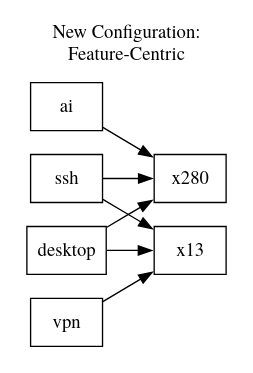Hey everyone! I’ve been on NixOS for a few months now and I’m trying to figure out the best way to organize my config. I want something that’s simple to understand but can grow with my setup.
So far I’ve landed on this structure:
├── flake.nix
├── core/ # System-wide common
│ ├── boot.nix
│ ├── fonts.nix
│ ├── packages.nix
│ └── ...
├── home/ # Home Manager common
│ ├── hyprland/
│ ├── scripts/
│ ├── firefox.nix
│ ├── nvf.nix
│ └── ...
└── hosts/
├── default/
│ ├── default.nix
│ ├── users.nix
│ ├── hardware.nix
│ └── ...
└── ...
My flake.nix is pretty straightforward:
{
outputs = { nixpkgs, ... }@inputs:
let
system = "x86_64-linux";
host = "alex";
username = "alex";
in {
nixosConfigurations = {
${host} = nixpkgs.lib.nixosSystem {
inherit system;
specialArgs = { inherit inputs username host; };
modules = [ ./hosts/${host} ];
};
};
};
}
Then each host pulls in the core system modules and sets up Home Manager:
# hosts/default/default.nix
{
imports = [
./users.nix
./drivers.nix
./hardware.nix
./host-packages.nix
];
}
# hosts/default/users.nix
{
imports = [
./../../core # All system modules
inputs.home-manager.nixosModules.home-manager
];
home-manager = {
useUserPackages = true;
useGlobalPkgs = true;
users.${username} = {
imports = [ ./../../home ]; # All HM configs
home.stateVersion = "24.11";
};
};
users.users.${username} = {
isNormalUser = true;
extraGroups = [ "wheel" "networkmanager" /* ... */ ];
};
}
The idea is that core/ has all the system-level common stuff, home/ has all common home-mgr configs, and each host just have this plus any host-specific tweaks.
I’m pretty happy with how clean this feels, but I’m still relatively new to NixOS so I’m curious:
- How do you organize your configs?
- Any obvious pitfalls with this approach?
- Is splitting core modules this granularly worth it, or overkill?
Would love to hear how others structure their setups!
Full config if anyone curious
